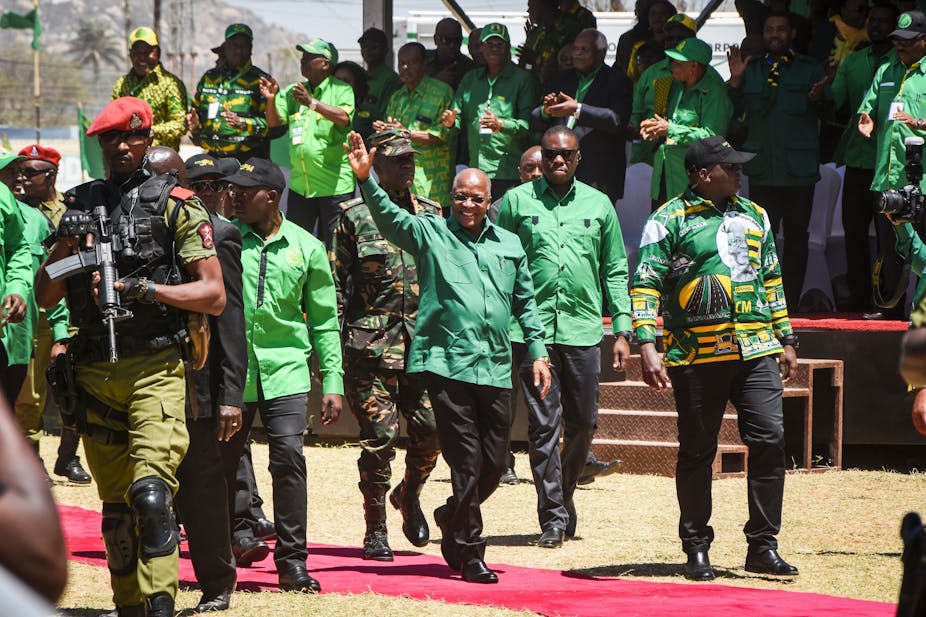Tanzania’s 2020 general elections resulted in a predictably easy victory for one of Africa’s oldest ruling parties, Chama Cha Mapinduzi.
The National Electoral Commission declared the incumbent, John Magufuli, the winner with 84.4% of the vote. His closest challenger, Chadema’s Tundu Lissu, garnered a paltry 13%. The ruling party also won 261 of the 264 parliamentary seats. This represents 98.86% of the total.
Similar results were reported in Zanzibar, a semi-autonomous island region of Tanzania. There the presidential candidate Hussein Mwinyi was declared the winner with 76.6% of the votes. The ruling party captured all but three House of Representative seats. Results also indicate that it won a landslide in the ward elections.
But the elections on the island and on the Tanzanian mainland were marred by serious irregularities and poll violence. The elections were carried out in an environment of widespread intimidation and harassment. There was heavy police and army deployment in the lead up to the elections.
After the poll, opposition leaders were arrested and detained and civilians were shot by the police.
Read more: Tanzanian poll is likely to usher in a new era of authoritarianism. Here's why
The results mean that Chama cha Mapinduzi now has absolute political control over Tanzania and Zanzibar – more than at any time since the advent of the multiparty era in 1992. The party’s domination has been shored up through repeated electoral victories, decades in power, and the exclusion of the opposition.
While there has been a global retreat in democracy Tanzania’s democratic rollback over the past five years has been unprecedented. Ever since Magufuli’s election in 2015 the democratic environment in Tanzania has changed.
The country is currently categorised as ‘partly free’ by Freedom House on its democratic index. Given events pre and post the election, it could soon be classified as 'not free’.
Dismembering the opposition
Magufuli’s first term started off on a positive note . He vowed to fight corruption and make government more efficient.
But it wasn’t long before his presidency became characterised by the persistent infringement of human rights, repressive laws and repression of political opposition.
For example, there were repeated arbitrary arrests and detentions of opposition politicians, a rise in police brutality, as well as a crackdown on the media and civil society.
The conduct of this year’s election exemplified this authoritarian turn.
From the onset of the latest electoral cycle, it was evident that Chama cha Mapinduzi was hellbent on winning and consolidating its grip on power. It soon became clear that the electoral commission was biased and that the police force was partisan.
In these circumstances, the opposition stood little chance of challenging the status quo.
Read more: Tanzanian election leaves a highly polarised society with an uncertain future
This is not unusual for opposition parties in a number of African countries. In an article published in 2018 I set out how opposition parties were regularly weakened in a systematic way by ruling parties. Tanzania fits this description.
Magufuli vowed to annihilate the opposition when he came to power five years ago. According to him, the opposition’s ‘politicking’ was a hindrance to the country’s development. By February 2016, he had banned all political party rallies. He then embarked on a systematic coopting of opposition figures into his party.
Some members of the opposition were offered government positions in exchange for allegiance to the ruling Chama cha Mapinduzi. The party denied that opposition members were being paid off, insisting that they had willingly defected to support the president’s development agenda. This alleged newfound unity of purpose was touted in Kiswahili as kuunga juhudi (supporting a joint effort).
Magufuli has also used laws to created a culture of fear and intimidation. For example, with the crackdown on the media, journalists are afraid of making any critical analysis.
This culture is prevalent even among his own party members. Chama cha Mapinduzi has gradually been de-institutionalised. Decades of institutional stability and value are being eroded. The persona of the president has become a dominant force. This shift has been described by experts as Tanzania’s authoritarian turn.
Magufuli’s attitude towards women has also been a marker of his conservative nature. He has made a series of misogynistic remarks which his supporters have tried to defend by claiming that they should be taken with a pinch of salt. One example was his suggestion to Kenyan president Uhuru Kenyatta, that Kenya’s then Foreign Affairs Cabinet Secretary Monica Juma be ‘given to him’. Magufuli went on to explain that she was not only a competent minister, but good-looking too.
The damage that Magufuli has done has extended beyond Tanzania. During his term he has managed to isolate the country internationally by pursuing an isolationist foreign policy and insisting on homegrown economic transformation efforts.
What next
The two main opposition parties, Chadema and ACT-Wazalendo, dismissed the elections as fraudulent and called for nationwide protests.
The government responded by arresting, and then releasing Chadema Chairman Freeman Mbowe and other party officials.
Presidential candidate Tundu Lissu, who survived an assassination attempt in 2017, was also apprehended and later released. He has now left the country for fear of political persecution.
Former Arusha Urban MP Godbless Lema is seeking asylum in Kenya also citing fears of political persecution. In Zanzibar, ACT-Wazalendo Deputy Secretary General Nassor Mazrui is still being held by the police since his arrest on 29 October 2020.
Magufuli looks to further increase his tight grip on power in the next five years. With virtually no opposition, and its choke hold on Tanzanian politics, the ruling Chama cha Mapinduzi looks set to cement its dominance, and entrench its authoritarian rule.
The opposition – however much it feels weakened – must now push for reforms. And it should boycott future elections until electoral reforms are put in place.

